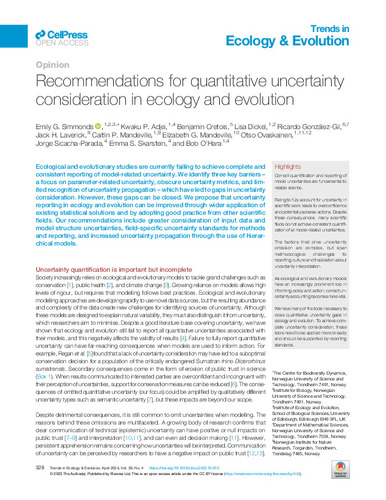Recommendations for quantitative uncertainty consideration in ecology and evolution
Publication date:
Publisher version:
Citación:
Descripción física:
Abstract:
Ecological and evolutionary studies are currently failing to achieve complete and consistent reporting of model-related uncertainty. We identify three key barriers – a focus on parameter-related uncertainty, obscure uncertainty metrics, and limited recognition of uncertainty propagation – which have led to gaps in uncertainty consideration. However, these gaps can be closed. We propose that uncertainty reporting in ecology and evolution can be improved through wider application of existing statistical solutions and by adopting good practice from other scientific fields. Our recommendations include greater consideration of input data and model structure uncertainties, field-specific uncertainty standards for methods and reporting, and increased uncertainty propagation through the use of hierarchical models.
Ecological and evolutionary studies are currently failing to achieve complete and consistent reporting of model-related uncertainty. We identify three key barriers – a focus on parameter-related uncertainty, obscure uncertainty metrics, and limited recognition of uncertainty propagation – which have led to gaps in uncertainty consideration. However, these gaps can be closed. We propose that uncertainty reporting in ecology and evolution can be improved through wider application of existing statistical solutions and by adopting good practice from other scientific fields. Our recommendations include greater consideration of input data and model structure uncertainties, field-specific uncertainty standards for methods and reporting, and increased uncertainty propagation through the use of hierarchical models.
ISSN:
Patrocinado por:
European Research Council (ERC) under the EU Horizon 2020 Research and Innovation Programme (856506); Biodiversity Genomics Europe (P-101059492)
Collections
- Artículos [37543]
Files in this item





